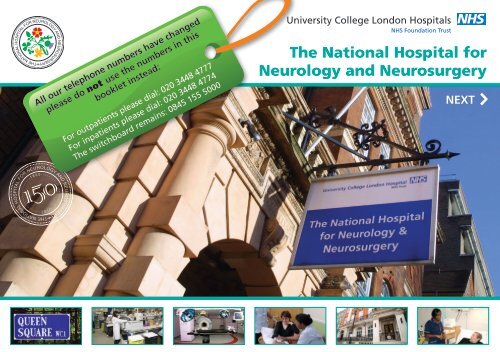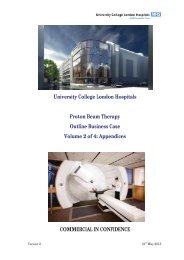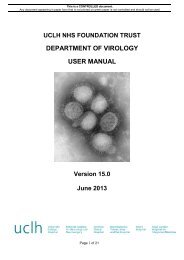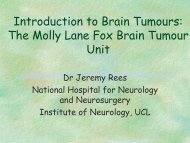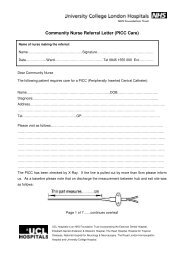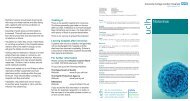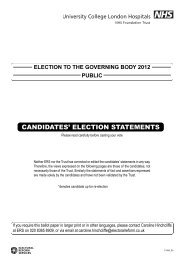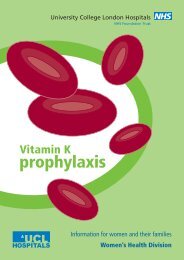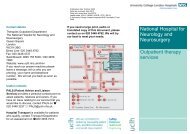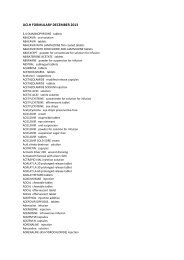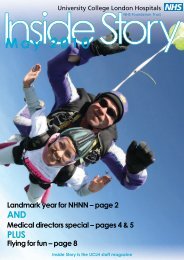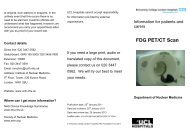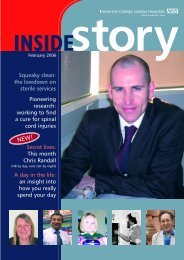The National Hospital for Neurology and Neurosurgery - UCL
The National Hospital for Neurology and Neurosurgery - UCL
The National Hospital for Neurology and Neurosurgery - UCL
Create successful ePaper yourself
Turn your PDF publications into a flip-book with our unique Google optimized e-Paper software.
NHS Foundation Trust<br />
<strong>The</strong> <strong>National</strong> <strong>Hospital</strong> <strong>for</strong><br />
<strong>Neurology</strong> <strong>and</strong> <strong>Neurosurgery</strong><br />
BACK<br />
NEXT<br />
2 0 1 0
Contents<br />
1<br />
This is an interactive document, all blue text can be clicked on to navigate to the relevant section:<br />
n Introduction<br />
n Research<br />
n <strong>National</strong> <strong>Hospital</strong> Development Foundation<br />
n Vision statement<br />
n Education <strong>and</strong> training<br />
n Linked hospitals<br />
n Nursing <strong>and</strong> care<br />
n Resources <strong>and</strong> buildings<br />
n Contact us<br />
n Governance<br />
n Services<br />
- General <strong>Neurology</strong><br />
- Hyper Acute Stroke Unit<br />
- Acute Brain Injury / Stroke Unit<br />
- Autonomic Unit<br />
- Centre <strong>for</strong> Neuromuscular Diseases<br />
- Critical Care<br />
- Dementia Centre<br />
- Epilepsy<br />
- Headache<br />
- Hyper Acute Stroke Unit<br />
- Metabolic Medicine<br />
- Movement Disorders<br />
- Multiple Sclerosis<br />
- <strong>National</strong> Prion Clinic<br />
- Neuro-anaesthetics<br />
- Neurogenetics<br />
- Neuroimmunology<br />
- Neuro-metabolic Unit<br />
- Neuro-oncology & Brain Tumour Unit<br />
- Neuro-ophthalmology<br />
- Neuro-otology & Voice Disorders<br />
- Neuropathology<br />
- Neurophysiology<br />
- Neuro-psychiatry<br />
- Neuropsychology<br />
- Neuroradiology<br />
- Neuro-rehabilitation<br />
- <strong>Neurosurgery</strong><br />
- Pain management<br />
- Spasticity<br />
- Spinal Surgery<br />
- Uro-neurology<br />
© NHNN/<strong>UCL</strong>H 2010 • Design by: <strong>UCL</strong> Medical Illustration - ICH
Introduction<br />
2<br />
<strong>The</strong> <strong>National</strong> <strong>Hospital</strong> <strong>for</strong> <strong>Neurology</strong> <strong>and</strong> <strong>Neurosurgery</strong><br />
(NHNN) is the UK’s largest dedicated neurological <strong>and</strong><br />
neurosurgical hospital treating over 6,000 inpatients, 120,000<br />
outpatients <strong>and</strong> 8,000 day cases each year. Celebrating 150<br />
years this year, it provides comprehensive services <strong>for</strong> the<br />
diagnosis, treatment <strong>and</strong> care of all conditions that affect the<br />
the brain, spinal cord, peripheral nervous system <strong>and</strong> muscles.<br />
It is part of the University College London <strong>Hospital</strong>s<br />
Foundation Trust, rated “excellent, excellent” by the Care<br />
Quality Commission <strong>and</strong> “<strong>Hospital</strong> Trust of the Year” by<br />
Dr Foster. Together with its neighbour, the Institute of<br />
<strong>Neurology</strong>, it is a major international centre <strong>for</strong> research<br />
<strong>and</strong> training with <strong>UCL</strong> being ranked fourth best University<br />
in the world. It also plays a large role in the recently<br />
established Academic Health Science Centre – <strong>UCL</strong><br />
Partners with neurology being one of the major themes.<br />
<strong>The</strong>re are many specialist units including dementia,<br />
epilepsy, multiple sclerosis <strong>and</strong> stroke. <strong>The</strong>re is a pioneering<br />
patient-centred neuro-rehabilitation service <strong>and</strong> the largest<br />
specialised neurosurgical-ITU <strong>and</strong> the only neuro-medical<br />
ITU in the country.<br />
Recent major developments include the MRC Centre <strong>for</strong><br />
Neuromuscular Diseases which brings together research<br />
<strong>and</strong> clinical care <strong>for</strong> patients with disorders of muscle <strong>and</strong><br />
peripheral nerve; <strong>and</strong> a new state-of-the-art neuroradiology<br />
department with the UK’s first interventional MRI scanner<br />
allowing surgeons to per<strong>for</strong>m MRI imaging during brain<br />
surgery operations.<br />
Divisional Clinical Director - Dr Mike Hanna<br />
Divisional Manager - Jackie Sullivan<br />
<strong>The</strong> NHNN has over 200 inpatient beds, with a dedicated<br />
day care facility <strong>for</strong> tests, investigation <strong>and</strong> treatment. We<br />
also have access to hotels, which offer a flexible service <strong>for</strong><br />
patients who do not need to stay in hospital overnight.<br />
With 32 outpatient consulting rooms, we offer around 200<br />
outpatient clinics every week covering all aspects of neurology,<br />
neurosurgery, neuropsychology <strong>and</strong> neuro-rehabilitation.<br />
BACK<br />
BACK<br />
NEXT<br />
NEXT<br />
© NHNN/<strong>UCL</strong>H 2010<br />
contents > introduction
Vision statement<br />
3<br />
NHNN, as part of <strong>UCL</strong>H<br />
<strong>and</strong> <strong>UCL</strong>P, is committed to<br />
delivering top quality patient<br />
care, excellent education<br />
<strong>and</strong> world class research.<br />
In collaboration with our<br />
close partner the Institute<br />
of <strong>Neurology</strong>, we aim to<br />
continue to develop <strong>and</strong><br />
maintain an unrivalled critical<br />
mass of research <strong>and</strong> clinical<br />
expertise to develop better<br />
treatments <strong>for</strong> patients with<br />
neurological diseases.<br />
BACK<br />
BACK<br />
NEXT<br />
NEXT<br />
© NHNN/<strong>UCL</strong>H 2010<br />
contents > vision statement
Services > General <strong>Neurology</strong><br />
4<br />
<strong>The</strong> hospital contains Europe’s largest collection of<br />
consultant neurologists which allows the full spectrum<br />
of neurological disorders to be comprehensively<br />
managed. <strong>The</strong> NHNN runs several general neurology<br />
clinics daily <strong>and</strong> patients with any neurological disorder<br />
may be referred to these clinics, including patients<br />
requiring urgent appointments. Where required,<br />
patients seen in general neurology clinics may be<br />
transferred to specialist clinics at NHNN.<br />
Outpatient Clinical <strong>Neurology</strong><br />
<strong>The</strong> majority of the 200 outpatient clinics held each week<br />
at the <strong>National</strong> are associated with clinical neurology.<br />
<strong>The</strong>se include both general neurology <strong>and</strong> specialist<br />
neurology clinics.<br />
Inpatient Clinical <strong>Neurology</strong><br />
Inpatient clinical neurology services are concentrated<br />
on three separate wards. Following admission, patients<br />
undergo a series of pre-booked investigations ensuring<br />
convenience <strong>for</strong> the patient <strong>and</strong>, at the same time,<br />
allowing the most efficient use of beds.<br />
A dedicated day case unit <strong>for</strong> clinical neurology patients<br />
provides a further level of choice <strong>and</strong> responsiveness <strong>for</strong><br />
patients who require treatments which can be given on a<br />
day-case basis.<br />
Choose <strong>and</strong> book<br />
To refer to this service:<br />
Select ‘Adult <strong>Neurology</strong>’ or ‘Second Opinion Adult <strong>Neurology</strong>’<br />
To contact this service:<br />
nhnnchoose<strong>and</strong>book@uclh.nhs.uk<br />
Telephone: 020 7692 2409<br />
Non choose <strong>and</strong> book<br />
To refer to this service:<br />
Write “Dear Dr” to: Patient Booking Team. (see contact us <strong>for</strong> address)<br />
To contact this service:<br />
nhnnappointments@uclh.nhs.uk<br />
Telephone: 020 7692 2371<br />
Clinical Lead - Dr Paul Jarman (outpatients), Dr Mary Reilly (inpatients)<br />
In addition, the hospital runs a 12-bed acute brain<br />
injury unit <strong>and</strong> a 7-bed telemetry unit <strong>for</strong> specialized<br />
investigations of patients with epilepsy.<br />
BACK<br />
BACK<br />
NEXT<br />
NEXT<br />
© NHNN/<strong>UCL</strong>H 2010<br />
contents > services > general neurology
Services > Hyper Acute Stroke Unit (HASU)<br />
5<br />
<strong>UCL</strong>H as part of <strong>UCL</strong> Partners is proud be to designated as<br />
one of eight Hyper Acute Stroke Units (HASU) in London,<br />
the only one in the North Central London, as part of<br />
Healthcare <strong>for</strong> London’s plan <strong>for</strong> the improvement in the<br />
quality of stroke care.<br />
<strong>The</strong> current HASU/Stroke Unit model consistently delivers<br />
high quality stroke care <strong>and</strong> excellent outcomes <strong>for</strong> stroke<br />
patients by taking advantage of world class expertise at<br />
<strong>UCL</strong>H <strong>and</strong> at the NHNN. <strong>UCL</strong>H/NHNN in partnership with<br />
<strong>UCL</strong>/Institute of <strong>Neurology</strong> has the largest translational<br />
academic stroke program in London <strong>and</strong> one of the<br />
largest in Europe.<br />
<strong>The</strong> HASU <strong>for</strong>ms part of the comprehensive neurosciences<br />
service. <strong>The</strong> unit is based at <strong>UCL</strong>H <strong>and</strong> accepts FAST<br />
positive patients. It has a highly skilled multi-disciplinary<br />
team led by the Queen Square Division. It will provide rapid<br />
assessment, thrombolytic <strong>and</strong> interventional treatment to<br />
patients in the hyperacute phase following stroke.<br />
“<br />
you have assembled an extremely<br />
talented <strong>and</strong> dedicated team of<br />
health care professionals <strong>and</strong> should<br />
be commended <strong>for</strong> this<br />
© NHNN/<strong>UCL</strong>H 2010<br />
“<br />
<strong>The</strong> dedicated HASU will admit all acute stroke patients in<br />
North Central London <strong>and</strong> bring experts <strong>and</strong> equipment<br />
under one roof to provide world-class treatment 24-hours<br />
a day, reducing death rates <strong>and</strong> long-term disability.<br />
This includes:<br />
n rapid assessment – a patient will arrive in the specialist<br />
stroke centre, be assessed by a specialist <strong>and</strong> have<br />
access to a brain scan within 30 minutes of arrival;<br />
n early treatment using clot-busting drugs<br />
(thrombolysis), if the scan shows they are needed;<br />
n 24/7 monitoring <strong>and</strong> physiologic intervention in a<br />
high dependency bed;<br />
n <strong>and</strong> a multi-disciplinary specialist team on call 24/7;<br />
including consultant neurologists, neurosurgeons<br />
<strong>and</strong> interventional radiologists, specialist nurses <strong>and</strong><br />
therapists<br />
To contact this service:<br />
Telephone: 07931 569 730<br />
Clinical Lead - Dr Nicholas Losseff<br />
BACK<br />
BACK<br />
NEXT<br />
contents > services > hyper acute stroke unit<br />
NEXT
Services > Acute Brain Injury / Stroke Unit<br />
6<br />
We have a 17-bed Acute Brain Injury / Stroke Unit as part<br />
of the Healthcare <strong>for</strong> London’s redesign of the specialist<br />
stroke services across London. <strong>The</strong> Stroke / Acute Brain<br />
Injury Unit is the next step of care <strong>for</strong> stroke patients<br />
who come to the HyperAcute Stroke Unit at <strong>UCL</strong>H. This<br />
unit aims to maximise functional recovery by exploring<br />
all means of neural protection <strong>and</strong> restoration after<br />
single incident brain injury. This provides organised acute<br />
inpatient treatment, care <strong>and</strong> rehabilitation followed<br />
by structured referral <strong>and</strong> follow-up <strong>for</strong> patients who<br />
have suffered stroke or a brain injury due to stroke,<br />
subarachnoid haemorrhage or head injury.<br />
To contact this service:<br />
teresa.feeney@uclh.nhs.uk<br />
Telephone: 0845 1555 000 Ext 723416<br />
Clinical Lead - Dr Richard Greenwood<br />
Inpatient activity is complemented by a Nurse Specialistled<br />
outreach service to each of the hospitals in the Trust<br />
<strong>and</strong> a follow-up outpatient service <strong>for</strong> recently discharged<br />
inpatients. This service includes a one-stop stroke clinic<br />
<strong>and</strong> a two-stop brain injury clinic, when outpatients have<br />
imaging <strong>and</strong> a neuropsychological assessment on the<br />
same day (stroke) or two weeks previously (brain injury),<br />
followed by consultant-led clinical assessment. <strong>The</strong><br />
Service has close clinical links with the Hyperacute Stroke<br />
Unit at <strong>UCL</strong>H, as well as the Neurorehabilitation Unit<br />
<strong>and</strong> Department of Neuropsychology at NHNN, <strong>and</strong> the<br />
Cardiac Department at the Heart <strong>Hospital</strong>.<br />
BACK<br />
BACK<br />
NEXT<br />
NEXT<br />
© NHNN/<strong>UCL</strong>H 2010<br />
contents > services > acute brain injury & stroke unit
Services > Autonomics<br />
7<br />
<strong>The</strong> autonomic nervous system supplies <strong>and</strong> influences<br />
virtually every organ in the body. Additionally, it is involved<br />
in major integrative processes such as control of blood<br />
pressure <strong>and</strong> body temperature.<br />
<strong>The</strong> Autonomic Unit provides a comprehensive national<br />
tertiary clinical service (combining both investigation <strong>and</strong><br />
management) <strong>for</strong> a wide variety of autonomic disorders.<br />
<strong>The</strong> unit enables people with autonomic symptoms, some<br />
of which are multiple <strong>and</strong> complex, to successfully manage<br />
their daily lives. Some examples are:<br />
n Pure Autonomic Failure<br />
n Autonomic dysfunction complicating Parkinson’s<br />
disease<br />
n Multiple System Atrophy (MSA)<br />
n Sweating dysfunction (e.g. hyperhidrosis,<br />
compensatory hyperhidrosis <strong>and</strong> anhidrosis)<br />
n Holmes-Adie Syndrome, Harlequin’s Syndrome<br />
n Autonomic dysfunction in spinal cord injury<br />
including autonomic dysreflexia<br />
n Neurally mediated syncope (vasovagal, carotid<br />
sinus hypersensitivity <strong>and</strong> situational e.g. swallow,<br />
micturition syncope)<br />
n <strong>The</strong> Postural Tachycardia Syndrome (PoTS)<br />
n Neurogenic hypertension<br />
n Autonomic diabetic neuropathy<br />
<strong>The</strong>re are four laboratories incorporating the latest<br />
advances in non-invasive technology <strong>and</strong> a catecholamine<br />
laboratory <strong>for</strong> the measurement of various autonomic<br />
neurotransmitters.<br />
As autonomic dysfunction is a feature of many<br />
neurological conditions, there is close <strong>and</strong> active clinical<br />
collaboration with many NHNN departments <strong>and</strong><br />
disciplines including clinical neurophysiology, clinical<br />
neuropsychology, movement disorders, <strong>and</strong> behavioural<br />
psychotherapy. Research affiliations include the Functional<br />
Imaging Laboratory at the ION, the ICN, the Department of<br />
Medicine at <strong>UCL</strong>, <strong>and</strong> the <strong>National</strong> Amyloidosis Centre at<br />
the Royal Free <strong>Hospital</strong>.<br />
To refer to this service:<br />
Write “Dear Dr” to: <strong>The</strong> Autonomic Unit (see contact us <strong>for</strong> address)<br />
To ask a question:<br />
Telephone: 0845 155 5000 Ext 723413<br />
Clinical Lead - Prof Christopher Mathias<br />
BACK<br />
BACK<br />
NEXT<br />
NEXT<br />
© NHNN/<strong>UCL</strong>H 2010<br />
contents > services > autonomics
Services > Dementia Centre<br />
8<br />
<strong>The</strong> Cognitive Disorders Service runs in parallel with the<br />
Dementia Research Centre (DRC), part of the Department<br />
of Neurodegenerative Disease at the ION. <strong>The</strong> clinical <strong>and</strong><br />
research components <strong>for</strong>m a national centre of excellence<br />
<strong>for</strong> diagnosis <strong>and</strong> treatment of patients with cognitive<br />
problems, <strong>and</strong> the group is recognised internationally <strong>for</strong><br />
ground breaking research in dementia.<br />
All <strong>for</strong>ms of cognitive disorder are seen; however, we<br />
have particular expertise in young onset dementia, familial<br />
dementias <strong>and</strong> unusual degenerative diseases. Progressive<br />
disorders such as Alzheimer’s disease (AD), vascular dementia<br />
or frontotemporal dementia are commonly seen, but other<br />
cognitive problems (both progressive <strong>and</strong> non-progressive)<br />
are also assessed including amnesia, aphasia, visuo-spatial<br />
problems, apraxia, facial recognition or attentional problems.<br />
<strong>The</strong> clinic has a national referral base <strong>and</strong> has agreed<br />
referral pathways with the local PCTs. Referrals are<br />
accepted from primary, secondary <strong>and</strong> tertiary care.<br />
Patients are assessed in a consultant-led multidisciplinary<br />
clinic, including neurology, psychiatry, psychology, imaging,<br />
specialist nurse, neurophysiology <strong>and</strong> allied disciplines. Where<br />
appropriate, patients are investigated on the same day with<br />
MRI, EEG <strong>and</strong> psychology. If necessary they can be admitted<br />
<strong>for</strong> further investigations to the Day Case Unit at the NHNN.<br />
© NHNN/<strong>UCL</strong>H 2010<br />
Ongoing communication is provided by the award-winning<br />
national CANDID (counselling <strong>and</strong> diagnosis in dementia)<br />
phone line <strong>and</strong> patient support groups.<br />
In addition to clinical care, all patients are offered the<br />
opportunity to participate in clinical trials <strong>and</strong> other<br />
studies at the DRC, <strong>and</strong> the service has close links with<br />
DeNDRoN (Clinical Research network <strong>for</strong> Dementia <strong>and</strong><br />
Neurodegenerative diseases) www.dementia.ion.ucl.ac.uk.<br />
Choose <strong>and</strong> book<br />
To refer to this service:<br />
Select ‘Cognitive’ under ‘<strong>Neurology</strong>’<br />
To contact this service:<br />
nhnnchoose<strong>and</strong>book@uclh.nhs.uk<br />
Telephone: 020 7692 2409<br />
Non choose <strong>and</strong> book<br />
To refer to this service:<br />
Write “Dear Dr” to: Cognitive Disorders Clinic (see contact us <strong>for</strong> address)<br />
To contact this service:<br />
cognitivedisordersclinic@uclh.nhs.uk<br />
Telephone: 08451 555 000 ext 723171<br />
Clinical Lead - Dr Catherine Mummery<br />
BACK<br />
BACK<br />
NEXT<br />
contents > services > dementia centre<br />
NEXT
Services > Critical Care<br />
9<br />
<strong>The</strong> Neurosurgical Intensive Care Unit (SITU) was<br />
re-launched in summer 2009 following extensive<br />
refurbishment <strong>and</strong> is a state-of-the-art 15-bed facility with<br />
nine level 3 beds <strong>and</strong> six level 2 beds. <strong>The</strong> unit provides<br />
a regional referral service <strong>for</strong> critically ill neurosurgical<br />
patients, particularly those with head injury <strong>and</strong> brain<br />
haemorrhage, from acute NHS Trusts within our network<br />
as well as a national tertiary referral service. In addition, the<br />
unit provides a regional <strong>and</strong> national service <strong>for</strong> patients<br />
admitted to NHNN <strong>for</strong> complex specialist neurosurgical <strong>and</strong><br />
spinal interventions. <strong>The</strong> unit has facilities <strong>for</strong> comprehensive<br />
multimodal intracranial monitoring at each bed <strong>and</strong> access<br />
to all relevant diagnostic <strong>and</strong> support services. We have<br />
established protocol-guided management, based on<br />
expert consensus guidance, to ensure the delivery of highquality<br />
clinical care. Clinical audit <strong>and</strong> robust governance<br />
arrangements also underpin our services.<br />
Close collaboration with colleagues on MITU at NHNN<br />
<strong>and</strong> the general ICU at <strong>UCL</strong>H allows access to other expert<br />
critical care input. Support by colleagues in neurosurgery,<br />
neuroradiology <strong>and</strong> neurophysiology ensures rapid access<br />
to diagnostic opinion <strong>and</strong> intervention. <strong>The</strong>re is also access<br />
to a variety of specialist non-neuroscience opinion from<br />
colleagues on the main campus of <strong>UCL</strong>H.<br />
SITU is recognised <strong>for</strong> training of medical <strong>and</strong> nursing<br />
staff <strong>and</strong> is the focus of an internationally-recognised,<br />
multidisciplinary research group. >><br />
<strong>The</strong> SITU multi-disciplinary team comprises medical staff,<br />
nursing staff, specialist therapists, pharmacists <strong>and</strong> other<br />
professional groups. A daily consultant intensivist-led ward<br />
round is the focus <strong>for</strong> patient management discussions<br />
<strong>and</strong> clinical decision making. In addition, daily review<br />
of patients by a consultant microbiologist provides high<br />
quality advice as well as promoting excellent st<strong>and</strong>ards of<br />
infection control.<br />
BACK<br />
BACK<br />
NEXT<br />
NEXT<br />
© NHNN/<strong>UCL</strong>H 2010<br />
contents > services > critical care
Services > Critical Care<br />
10<br />
<strong>The</strong> Neuromedical Intensive Care Unit (MITU) at NHNN<br />
is the only unit in the UK dedicated to the intensive care<br />
treatment of neuromedical disorders – as with the SITU this<br />
has been relaunched in Summer 2009 <strong>and</strong> is state-of-theart.<br />
It has built up an unrivalled experience in managing<br />
both common <strong>and</strong> rare neurological diseases that require<br />
respiratory support.<br />
To contact this service:<br />
SITU: 0845 155 5000<br />
MITU: 0207 892 8718<br />
Clinical Lead - Dr Martin Smith (SITU), Dr Nick Hirsch (MITU)<br />
It has an integrated multidisciplinary team which includes<br />
neurologists, anaesthetists, nursing staff, physiotherapists,<br />
speech therapists <strong>and</strong> dieticians. All have special expertise<br />
in the management of the complex neurological disorders<br />
seen in the unit including the diagnosis <strong>and</strong> treatment of<br />
conditions such as Guillain-Barré syndrome, status epilepticus,<br />
status dystonicus <strong>and</strong> encephalitis. <strong>The</strong> unit is also responsible<br />
<strong>for</strong> the Trust’s thymectomy service <strong>and</strong> annually per<strong>for</strong>ms one<br />
quarter of the UK cases. We have published on the efficacy of<br />
this treatment <strong>for</strong> myasthenia gravis.<br />
<strong>The</strong> unit prides itself on the involvement of relatives<br />
in the overall management of the patient. Inevitably,<br />
some patients with severe disease may not be able to be<br />
weaned from mechanical ventilation. As a result, difficult<br />
<strong>and</strong> sensitive ethical decisions have to be discussed with<br />
patients <strong>and</strong> their relatives. <strong>The</strong> team within the unit is very<br />
experienced in dealing with this dilemma.<br />
BACK<br />
BACK<br />
NEXT<br />
NEXT<br />
© NHNN/<strong>UCL</strong>H 2010<br />
contents > services > critical care
Services > Epilepsy<br />
11<br />
<strong>The</strong> epilepsy group at NHNN is the largest tertiary<br />
epilepsy service in the UK. Patients are assessed <strong>and</strong><br />
treated by a wide range of professionals, including<br />
neurologists, neuro-psychologists, nurse specialists,<br />
neuro-surgeons, neuro-psychiatrists <strong>and</strong> social workers.<br />
<strong>The</strong> group is integrated with the <strong>UCL</strong> Institute of<br />
<strong>Neurology</strong> at Queen Square <strong>and</strong> the Chalfont Centre,<br />
where additional inpatient facilities <strong>and</strong> long-term<br />
residential care is provided. We have an active epilepsy<br />
surgery programme <strong>and</strong> through our links with the <strong>UCL</strong><br />
Institute of <strong>Neurology</strong>, patients have access to the latest<br />
diagnostic <strong>and</strong> therapeutic advances. In all the NHNN<br />
Epilepsy Service receives 1200 new referrals per year <strong>and</strong><br />
has over 9000 patients under active follow-up.<br />
Chalfont<br />
<strong>The</strong> <strong>National</strong> Society <strong>for</strong> Epilepsy (NSE) is the largest<br />
medical charity in the field of epilepsy in the UK, providing<br />
services <strong>for</strong> people with epilepsy <strong>for</strong> over 100 years. Based<br />
in Chalfont St Peter, Buckinghamshire, UK, its mission<br />
is “to enhance the quality of life of people affected by<br />
epilepsy by promoting research, education <strong>and</strong> public<br />
awareness <strong>and</strong> by delivering specialist medical care <strong>and</strong><br />
support services.” <strong>The</strong> NSE has close partnerships with<br />
NHNN <strong>and</strong> the <strong>UCL</strong> Institute of <strong>Neurology</strong>.<br />
<strong>The</strong> purpose built Gowers Assessment Unit in Chalfont St<br />
Peter is a 26-bed facility has the latest video-EEG telemetry,<br />
MRI, drug level monitoring, neurology, neuropsychiatry<br />
<strong>and</strong> psychology, <strong>and</strong> admits 750 patients per year from<br />
all over the UK <strong>and</strong> Irel<strong>and</strong> <strong>for</strong> in-depth multi-disciplinary<br />
assessment <strong>and</strong> treatment. www.epilepsysociety.org.uk<br />
<strong>The</strong> group aims to provide a first-class local epilepsy service<br />
with strong links to general practice, other departments in<br />
the hospital <strong>and</strong> tertiary care. Specialist clinics include a “first<br />
seizure” clinic, an obstetric neurology clinic, refractory epilepsy<br />
clinics, helplines <strong>and</strong> access to a specialist epilepsy counsellor.<br />
Choose <strong>and</strong> book<br />
To refer to this service:<br />
Select ‘Epilepsy’<br />
To contact this service:<br />
nhnnchoose<strong>and</strong>book@uclh.nhs.uk<br />
Telephone: 020 7692 2409<br />
Non choose <strong>and</strong> book<br />
To refer to this service:<br />
Write “Dear Dr” to: Epilepsy service (see contact us <strong>for</strong> address)<br />
To contact this service:<br />
nhnnappointments@uclh.nhs.uk<br />
Telephone: 020 7692 2371<br />
Clinical Lead - Prof John Duncan<br />
BACK<br />
BACK<br />
NEXT<br />
NEXT<br />
© NHNN/<strong>UCL</strong>H 2010<br />
contents > services > epilepsy
Services > Headache<br />
12<br />
<strong>The</strong> Headache Group runs both a clinical <strong>and</strong> research<br />
service, including a large outpatient <strong>and</strong> inpatient<br />
service. <strong>The</strong> dedicated inpatient service is unique to the<br />
United Kingdom, offering treatments that are not readily<br />
available elsewhere.<br />
In addition to the three consultant neurologists, the<br />
clinical service is supported by a locum consultant<br />
neurologist, three clinical nurse specialists, junior doctors<br />
<strong>and</strong> research fellows.<br />
<strong>The</strong> service is dedicated to tertiary referrals from patients<br />
with intractable head <strong>and</strong> facial pain disorder who have<br />
been seen by neurologists elsewhere in the country.<br />
<strong>The</strong> range of pain disorders includes chronic migraine,<br />
medication overuse headache, cluster headache,<br />
paroxysmal hemicrania, SUNCT, hemicrania continua, new<br />
persistent daily headache, <strong>and</strong> facial pain.<br />
<strong>The</strong>re are close links with neurosurgery <strong>and</strong> the <strong>Hospital</strong><br />
runs a dedicated Occipital Nerve Stimulation clinic.<br />
Choose <strong>and</strong> book<br />
To refer to this service:<br />
Select ‘Adult <strong>Neurology</strong>’ or ‘Second Opinion Adult <strong>Neurology</strong>’<br />
To contact this service:<br />
nhnnchoose<strong>and</strong>book@uclh.nhs.uk<br />
Telephone: 020 7692 2409<br />
Non choose <strong>and</strong> book<br />
To refer to this service:<br />
Write “Dear Dr” to: Patient Booking Team (see contact us <strong>for</strong> address)<br />
To contact this service:<br />
nhnnappointments@uclh.nhs.uk<br />
Telephone: 020 7692 2371<br />
This service only accepts tertiary referrals so if you would like to refer to<br />
a Headache specialist first refer to ‘adult neurology’ <strong>and</strong> we will refer on<br />
if necessary.<br />
Clinical Lead - Dr Manjit Matharu / Dr Anish Bahra<br />
You spoke to me as a person,<br />
“ not just a number<br />
“<br />
BACK<br />
BACK<br />
NEXT<br />
NEXT<br />
© NHNN/<strong>UCL</strong>H 2010<br />
contents > services > headache
Services > Metabolic Medicine<br />
13<br />
<strong>The</strong> Charles Dent Metabolic Unit is one of the largest<br />
<strong>and</strong> longest established services in the world <strong>for</strong> the<br />
treatment of adolescents <strong>and</strong> adults with inherited<br />
metabolic diseases. We are one of the designated<br />
national lysosomal storage disease centres. <strong>The</strong> unit<br />
provides specialist medical, dietetic <strong>and</strong> nursing advice<br />
<strong>and</strong> has a purpose-built metabolic diet kitchen to support<br />
treatment <strong>and</strong> education of patients. We also have an<br />
infusion unit which provides the facilities needed <strong>for</strong><br />
patients on enzyme replacement <strong>and</strong> other therapies.<br />
To refer to this service:<br />
Write “Dear Dr” to: Charles Dent Metabolic Unit<br />
(see contact us <strong>for</strong> address)<br />
To contact this service:<br />
robin.lachmann@uclh.nhs.uk<br />
Telephone: 020 7829 8778<br />
Clinical Lead - Dr Robin Lachmann<br />
“<br />
I have been coming here <strong>for</strong> twenty<br />
years <strong>and</strong> you never cease to amaze me.<br />
Your dedication, care <strong>and</strong> hard work is<br />
unparalleled<br />
“<br />
BACK<br />
BACK<br />
NEXT<br />
NEXT<br />
© NHNN/<strong>UCL</strong>H 2010<br />
contents > services > metabolic medicine
Services > Movement Disorders<br />
14<br />
<strong>The</strong> movement disorders group specialises in the<br />
assessment, diagnosis <strong>and</strong> treatment of people with<br />
diseases such as Parkinson’s disease, dystonia, tremor,<br />
myoclonus <strong>and</strong> chorea. <strong>The</strong> group is also a major centre<br />
providing <strong>for</strong> the surgical treatment (including deep<br />
brain stimulation) of movement disorders, particularly<br />
Parkinson’s disease, dystonia <strong>and</strong> essential tremor. Finally,<br />
the group also makes a major contribution to education<br />
<strong>and</strong> research in movement disorders.<br />
We offer a number of specialist clinics or services<br />
including apomorphine therapy, botulinum toxin,<br />
paroxysmal movement disorders, specialised<br />
neurophysiology <strong>and</strong> assessment of jerks, spasms<br />
<strong>and</strong> stiffness. We offer a multidisciplinary clinic <strong>for</strong><br />
evaluation of patients with movement disorder in view<br />
of Deep Brain Stimulation.<br />
Choose <strong>and</strong> book<br />
To refer to this service:<br />
‘Movement disorder’ under ‘<strong>Neurology</strong>’<br />
To contact this service:<br />
nhnnchoose<strong>and</strong>book@uclh.nhs.uk<br />
Telephone: 020 7692 2409<br />
Non choose <strong>and</strong> book<br />
To refer to this service:<br />
Write “Dear Dr” to: Patient Booking Team (see contact us <strong>for</strong> address)<br />
To contact this service:<br />
nhnnappointments@uclh.nhs.uk<br />
Telephone: 020 7692 2371<br />
Clinical Lead - Prof Andrew Lees<br />
BACK<br />
BACK<br />
NEXT<br />
NEXT<br />
© NHNN/<strong>UCL</strong>H 2010<br />
contents > services > movement disorders
Services > Multiple Sclerosis<br />
15<br />
<strong>The</strong> MS multidisciplinary team offers a wide range of<br />
expert specialist advice regarding MS management.<br />
Specialist clinics <strong>and</strong> services include a one stop diagnostic<br />
clinic, rapid access relapse management service,<br />
disease modifying therapies, current research projects,<br />
symptom management, rehabilitation, complex symptom<br />
management <strong>and</strong> end of life care. We have a team of<br />
specialist nurses who provide support <strong>and</strong> run both<br />
conventional outpatient clinics <strong>and</strong> telephone clinics.<br />
People want access to timely assessment, expertise <strong>and</strong><br />
advice <strong>and</strong> that people’s needs may vary according to the<br />
stage of their condition. In order to meet these needs we<br />
have set up a number of clinics that aim to make sure that<br />
our patients see the right person, in the right place, at the<br />
right time. >><br />
“<br />
I wanted to thank you because I remember<br />
you saying that you would hold my h<strong>and</strong>,<br />
that you would stay by me, with me<br />
throughout the operation <strong>and</strong> these two<br />
things gave me hope <strong>and</strong> com<strong>for</strong>t in a<br />
moment of real uncertainty <strong>and</strong> fear<br />
“<br />
BACK<br />
BACK<br />
NEXT<br />
NEXT<br />
© NHNN/<strong>UCL</strong>H 2010<br />
contents > services > multiple sclerosis
Services > Multiple Sclerosis<br />
16<br />
n Demyelination Diagnostic Clinic (DDC) - <strong>for</strong> people<br />
who are suspected of having MS<br />
n Relapse clinic - designed to discuss any new<br />
symptoms or old symptoms<br />
n Disease modifying drug assessment clinics -<br />
weekly assessment clinics <strong>for</strong> patients taking<br />
particular treatments<br />
n Assessment, support <strong>and</strong> education clinic - weekly<br />
clinic provides an opportunity <strong>for</strong> people with MS to<br />
discuss concerns about living with MS<br />
n Vocational rehabilitation clinic - to support people<br />
with MS in their working or student roles<br />
n MS multidisciplinary clinic – MS symptoms can<br />
cause a number of health problems, so this clinic<br />
is designed to look at the different problems <strong>and</strong><br />
provide different outcomes<br />
n Complex needs clinic - our team links up with<br />
colleagues in the palliative care team to help<br />
address symptoms that have become harder to<br />
manage <strong>and</strong> which may cause increasing disability<br />
<strong>and</strong> loss of independence.<br />
n Telephone review <strong>and</strong> assessment clinic lead by a<br />
Nurse Consultant<br />
n Specialist nurse telephone advice line <strong>for</strong> assessment<br />
<strong>and</strong> triage between planned clinic visits.<br />
Choose <strong>and</strong> book<br />
To refer to this service:<br />
‘MS’ under ‘<strong>Neurology</strong>’<br />
To contact this service:<br />
nhnnchoose<strong>and</strong>book@uclh.nhs.uk<br />
Telephone: 020 7692 2409<br />
Non choose <strong>and</strong> book<br />
To contact this service:<br />
nhnnappointments@uclh.nhs.uk<br />
Telephone: 020 7692 2371<br />
Diagnostics - Prof Alan Thompson<br />
Disease modifying treatment - Prof David Miller<br />
Relapse - Dr Jeremy Chataway<br />
Integrated care - Susan Hourihan<br />
BACK<br />
BACK<br />
NEXT<br />
NEXT<br />
© NHNN/<strong>UCL</strong>H 2010<br />
contents > services > multiple sclerosis
Services > <strong>National</strong> Prion Clinic<br />
17<br />
<strong>The</strong> <strong>National</strong> Prion Clinic’s (NPC) multidisciplinary team<br />
is comprised of consultant neurologists, clinical research<br />
fellows, a counsellor <strong>and</strong> clinical nurse specialists. We<br />
offer comprehensive assessment, diagnostic services <strong>and</strong><br />
investigations <strong>for</strong> all <strong>for</strong>ms of the disease. This includes<br />
neuropsychology, neurophysiology, imaging, genetic testing,<br />
<strong>and</strong> tissue diagnosis. We are a mobile service, visiting<br />
patients throughout the UK at short notice to provide<br />
clinical expertise <strong>for</strong> a rare neurodegenerative disease.<br />
Prion diseases remain rare but it is possible that the<br />
numbers of people affected by variant CJD, the prion<br />
disease linked to BSE, may increase. <strong>The</strong> NPC is the<br />
national referral centre <strong>for</strong> prion disease, <strong>and</strong> works<br />
closely with the MRC Prion Unit, based at the Institute of<br />
<strong>Neurology</strong>. An extensive research programme is seeking to<br />
promote early diagnosis <strong>and</strong> develop treatments <strong>for</strong> this<br />
group of diseases.<br />
<strong>The</strong> service includes:<br />
n Comprehensive investigations <strong>and</strong> assessment <strong>for</strong> all<br />
<strong>for</strong>ms of the disease.<br />
n Tonsil biopsy as a means of diagnosing variant CJD.<br />
n Genetic testing (diagnostic <strong>and</strong> predictive) <strong>for</strong><br />
inherited/familial prion disease.<br />
n In<strong>for</strong>mation <strong>and</strong> advice, support <strong>and</strong> counselling <strong>for</strong><br />
patients <strong>and</strong> their families, during investigation <strong>and</strong><br />
diagnosis, <strong>and</strong> long term follow up care. We aim<br />
to work closely with, <strong>and</strong> provide in<strong>for</strong>mation <strong>and</strong><br />
support <strong>for</strong> professionals working with registered<br />
patients in their local area.<br />
n General in<strong>for</strong>mation <strong>and</strong> advice by telephone <strong>and</strong><br />
email.<br />
n Study days, family in<strong>for</strong>mation days <strong>and</strong> training<br />
workshops.<br />
the suport from all the staff<br />
“ is totally excellent<br />
“<br />
To contact the NPC:<br />
Write to: <strong>National</strong> Prion Clinic (see contact us <strong>for</strong> address)<br />
Telephone: 020 7692 2397<br />
Clinical Lead - Dr Simon Mead<br />
BACK<br />
BACK<br />
NEXT<br />
NEXT<br />
© NHNN/<strong>UCL</strong>H 2010<br />
contents > services > national prion clinic
Services > Neuro-anaesthetics<br />
18<br />
<strong>The</strong> department is responsible <strong>for</strong> the provision of<br />
anaesthetic services to four operating theatres plus the<br />
newly commissioned interventional MRI operating suite. In<br />
addition, the department also provides anaesthetic support<br />
<strong>for</strong> the Neuroradiology Department. <strong>The</strong> total caseload <strong>for</strong><br />
2009 was over 3200 cases.<br />
Consultant anaesthetists are responsible <strong>for</strong> both the<br />
Surgical <strong>and</strong> Medical Intensive Care Units as well as<br />
having a major input into the Pain Management Unit.<br />
<strong>The</strong> department also leads the Acute Pain Service, an<br />
important facet of anaesthetic practice. Recently the role<br />
of the department has exp<strong>and</strong>ed to include the setting<br />
up of an outreach team to allow continuing care when<br />
patients are discharged from the Intensive Care Units to<br />
the general wards. Similarly, the tracheostomy team, which<br />
includes physiotherapists, anaesthetists <strong>and</strong> speech <strong>and</strong><br />
language therapists has revolutionised the care of patients<br />
with airway problems.<br />
Education is a fundamental role of the department.<br />
In addition to providing core training in all aspects of<br />
neuroanaesthetic <strong>and</strong> neurocritical care practice <strong>for</strong><br />
anaesthetists, additional training <strong>for</strong> those who wish to<br />
pursue a career in neuroanaesthesia is ensured by the<br />
provision of clinical fellow posts (which are both popular<br />
<strong>and</strong> keenly contested).<br />
To contact this service:<br />
Telephone: 020 7829 8711<br />
Clinical Lead - Dr Kath Hunt<br />
BACK<br />
BACK<br />
NEXT<br />
NEXT<br />
© NHNN/<strong>UCL</strong>H 2010<br />
contents > services > neuro-anaesthetics
Services > Neurogenetics<br />
19<br />
<strong>The</strong> Neurogenetics Unit at the <strong>National</strong> <strong>Hospital</strong> <strong>for</strong><br />
<strong>Neurology</strong> <strong>and</strong> <strong>Neurosurgery</strong> offers a fully integrated service<br />
encompassing clinical assessment, diagnosis, molecular<br />
genetic testing <strong>and</strong> counselling <strong>for</strong> neurogenetic conditions.<br />
<strong>The</strong> Neurogenetics Laboratory provides a regional service<br />
<strong>for</strong> inherited neurological disease <strong>and</strong> a national <strong>and</strong><br />
international diagnostic service <strong>for</strong> rare neurogenetic<br />
disorders. In particular, we have clinical <strong>and</strong> scientific<br />
expertise in inherited movement disorders including<br />
Huntington’s disease (www.hdresearch.ucl.ac.uk), ataxia<br />
<strong>and</strong> familial Parkinsonian diseases,neuromuscular disorders<br />
including peripheral neuropathies, channelopathies <strong>and</strong><br />
mitochondrial disorders. A comprehensive user manual is<br />
available from the laboratory on request.<br />
include channelopathies, neuropathies <strong>and</strong> mitochondrial<br />
disease as well as common diseases such as epilepsy <strong>and</strong><br />
Parkinson Disease.<br />
To contact this service:<br />
Write to: Neurogenetics Unit (see contact us <strong>for</strong> address)<br />
Telephone: 0845 155 5000<br />
Professor N.W.Wood - ext 72 4255<br />
Head of Laboratory - ext 72 4250<br />
Clinical Lead - Prof Nick Wood<br />
Head of Laboratory - Dr Mary Davis<br />
<strong>The</strong> laboratory is CPA accredited <strong>and</strong> a member of the<br />
UK Genetic Testing Network <strong>and</strong> is situated within the<br />
Department of Molecular Neuroscience at the NHNN/<strong>UCL</strong>.<br />
Close ties with clinical colleagues mean that the service<br />
is constantly developing in line with clinical need <strong>and</strong> so<br />
provides users (both patients <strong>and</strong> medical professionals)<br />
with an up-to-date <strong>and</strong> comprehensive service.<br />
Laboratory staff actively contribute to <strong>and</strong> supervise<br />
research projects. <strong>The</strong> focus of much of the research is<br />
the molecular basis of neurogenetic disorders <strong>and</strong> these<br />
BACK<br />
BACK<br />
NEXT<br />
NEXT<br />
© NHNN/<strong>UCL</strong>H 2010<br />
contents > services > neurogenetics
Services > Neuroimmunology<br />
20<br />
<strong>The</strong> Department of Neuroimmunology is a unique facility in<br />
the United Kingdom both in terms of service provision <strong>and</strong><br />
as a research centre. It conducts analysis of cerebrospinal<br />
fluid (CSF) <strong>for</strong> the Trust – a vital service that allows the<br />
rapid <strong>and</strong> accurate diagnosis of a multitude of acute <strong>and</strong><br />
chronic neurological diseases. Bacterial meningitis remains<br />
one of the most devastating acute infections of the CNS<br />
<strong>and</strong> successful treatment of this condition requires rapid<br />
analysis of the CSF. <strong>The</strong> department can provide results of<br />
CSF analysis within ten minutes of receiving the specimen.<br />
To contact this service:<br />
Write to: Neuro-immunology <strong>and</strong> CSF Laboratory<br />
(see contact us <strong>for</strong> address)<br />
Telephone: 020 7676 2152<br />
Clinical Lead - Dr Mike Lunn<br />
In addition to processing some 2,000 CSF samples<br />
per annum from the Trust <strong>Hospital</strong>s, the department<br />
also analyses approximately 5,000 samples from other<br />
national <strong>and</strong> international centres; it is thus the busiest<br />
laboratory of its type in the world. All results of analysis<br />
are held within a database which now contains almost<br />
100,000 entries – a unique library <strong>for</strong> both clinical <strong>and</strong><br />
research purposes.<br />
BACK<br />
BACK<br />
NEXT<br />
NEXT<br />
© NHNN/<strong>UCL</strong>H 2010<br />
contents > services > neuroimmunology
Services > Neuro-metabolic Unit<br />
21<br />
<strong>The</strong> Neuro-metabolic Unit, is the only designated<br />
supra-regional centre in the UK <strong>for</strong> the investigation of<br />
neuro-metabolic disorders. It provides a unique range<br />
of investigations <strong>and</strong> clinical advice encompassing<br />
mitochondrial, neurotransmitter, pterin <strong>and</strong> amino<br />
acid disorders <strong>and</strong> utilises state of the art analytical<br />
technologies. In addition to servicing the needs of the<br />
<strong>UCL</strong>H Trust, due to its status as a UK referral centre, it<br />
receives clinical samples <strong>and</strong> requests <strong>for</strong> advice from all<br />
the major teaching hospitals <strong>and</strong> increasingly many district<br />
general, as well as international hospitals.<br />
<strong>The</strong> activities of the unit support many groups within<br />
the NHNN <strong>and</strong> the wider activities of <strong>UCL</strong>H Trust. In<br />
particular, close clinical associations continue to be<br />
<strong>for</strong>ged with our colleagues within the Movement<br />
Disorders, Muscle, Neurogenetic, Charles Dent Metabolic<br />
<strong>and</strong> Intensive Care Units.<br />
To contact to this service:<br />
Write to: Neurometabolic Unit (see contact us <strong>for</strong> address)<br />
Telephone: 0845 155 5000 Ext 723818<br />
Clinical Lead - Dr John L<strong>and</strong><br />
BACK<br />
BACK<br />
NEXT<br />
NEXT<br />
© NHNN/<strong>UCL</strong>H 2010<br />
contents > services > neuro-metabolic unit
Services > Centre <strong>for</strong> Neuromuscular Diseases<br />
22<br />
<strong>The</strong> Centre <strong>for</strong> Neuromuscular Diseases draws together<br />
the expertise of a large team of specialist clinical<br />
neurologists, neurophysiologists, neuropathologists,<br />
neurophysiotherapists <strong>and</strong> specialist nurses in the clinical<br />
management of neuromuscular muscle wasting diseases<br />
such as motor neuron disease, myasthenia gravis, muscular<br />
dystrophy <strong>and</strong> peripheral neuropathy. In addition there is<br />
an active clinical <strong>and</strong> preclinical research programme into<br />
these disorders. As such, it is one of the leading centres <strong>for</strong><br />
research into neuromuscular diseases in the UK.<br />
We see around 3,500 patients each year in the<br />
muscle, peripheral nerve, motor-neurone disease <strong>and</strong><br />
myasthenia clinics. <strong>The</strong> muscle <strong>and</strong> peripheral nerve<br />
services have both experienced a rapid expansion in<br />
recent years, driven by dem<strong>and</strong> <strong>for</strong> treatment. We are<br />
also actively involved in research into the genetic <strong>and</strong><br />
acquired neuromuscular diseases, <strong>and</strong> in clinical trials of<br />
new treatments <strong>and</strong> offer specialist clinics <strong>for</strong> genetic<br />
Neuromuscular Diseases.<br />
We have recently been awarded a grant to set up the<br />
MRC Centre <strong>for</strong> Neuromuscular Diseases at <strong>UCL</strong> <strong>and</strong> the<br />
<strong>National</strong> <strong>Hospital</strong>, in conjunction with the University of<br />
Newcastle <strong>and</strong> Great Ormond Street <strong>Hospital</strong>. <strong>The</strong> Centre,<br />
the first of its kind in the UK, promotes translational<br />
research in neuromuscular disease - a bench to bedside<br />
approach that is intended to facilitate the rapid transfer of<br />
research knowledge to the clinical environment.<br />
For more in<strong>for</strong>mation please go to our website<br />
www.ucl.ac.uk/neuromuscular<br />
To contact to this service:<br />
Telephone: 0845 155 5000 Ext 723014<br />
Clinical Lead - Prof Mike Hanna <strong>and</strong> Dr Mary Reilly<br />
BACK<br />
BACK<br />
NEXT<br />
NEXT<br />
© NHNN/<strong>UCL</strong>H 2010<br />
contents > services > centre <strong>for</strong> neuromuscular diseases
Services > Neuro-oncology<br />
23<br />
<strong>The</strong> Neuro-oncology service treats patients with, or<br />
suspected of having, any <strong>for</strong>m of brain or spinal tumour.<br />
We provide multi-disciplinary care <strong>for</strong> patients who are<br />
referred from their GPs or from other hospitals. Although<br />
brain <strong>and</strong> spinal tumours are relatively rare conditions<br />
they cause significant problems <strong>for</strong> patients <strong>and</strong> carers<br />
alike <strong>and</strong> require a variety of different experts to look<br />
after the patients.<br />
In late 2010 we will be opening a br<strong>and</strong> new Brain Tumour<br />
Unit which will be a 12 bed specialist ward.<br />
<strong>The</strong> clinical service is run through a weekly multidisciplinary<br />
team meeting (MDT) <strong>and</strong> works closely with research<br />
groups based at the Institute of <strong>Neurology</strong>, <strong>and</strong> <strong>UCL</strong><br />
Cancer Institute. Particular research interests include<br />
imaging of patients with brain tumours, new radiotherapy<br />
techniques including Intensity Modulated Radiotherapy<br />
(IMRT) <strong>and</strong> molecular biology of brain tumours. <strong>The</strong>re are<br />
close links with the <strong>National</strong> Cancer Research Network<br />
Brain Tumour Group <strong>and</strong> the European Organisation <strong>for</strong><br />
Research <strong>and</strong> Treatment of Cancer (EORTC).<br />
<strong>The</strong> service currently includes:<br />
n Comprehensive investigation <strong>and</strong> treatment <strong>for</strong> all<br />
<strong>for</strong>ms of brain <strong>and</strong> spinal tumour including brain<br />
metastases<br />
n Investigation of patients with paraneoplastic<br />
neurological syndromes<br />
n Molecular testing <strong>for</strong> 1p19q deletions in<br />
oligodendrogliomas <strong>and</strong> MGMT methylation in<br />
Glioblastoma Multi<strong>for</strong>me<br />
n In<strong>for</strong>mation, advice, support <strong>and</strong> counselling <strong>for</strong><br />
patients <strong>and</strong> their families, both during investigation,<br />
on diagnosis, <strong>and</strong> long term follow up. We also<br />
work closely with professionals working in palliative<br />
care services<br />
n Access to clinical trials<br />
To contact this service:<br />
braintumourunit@uclh.nhs.uk<br />
Telephone: 020 7391 8830<br />
Clinical Lead - Dr Susan Short / Dr Jeremy Rees<br />
<strong>Neurosurgery</strong> Lead - Mr Neil Kitchen<br />
BACK<br />
BACK<br />
NEXT<br />
NEXT<br />
© NHNN/<strong>UCL</strong>H 2010<br />
contents > services > neuro-oncology
Services > Neuro-ophthalmology<br />
24<br />
Typically, patient care is multidisciplinary. Specialist<br />
diagnostic <strong>and</strong> follow-up clinics are provided within the<br />
Eye Clinic which are most often used <strong>for</strong> patients who<br />
develop visual problems in association with neurological<br />
disease, <strong>for</strong> example idiopathic intracranial hypertension,<br />
pituitary tumours, epilepsy, multiple sclerosis <strong>and</strong><br />
cerebrovascular disease. <strong>The</strong>re are additional facilites <strong>for</strong><br />
EMG-guided orbital botulinum therapies <strong>and</strong> pupillometry,<br />
<strong>and</strong> there are close links with <strong>UCL</strong> Institutes of <strong>Neurology</strong><br />
<strong>and</strong> Ophthalmology, <strong>and</strong> Moorfields Eye <strong>Hospital</strong>.<br />
To contact this service:<br />
Write to: Esther Meredith, Department of Neuro-Ophthalmology<br />
(see contact us <strong>for</strong> address)<br />
Fax: 020 7676 2041<br />
Clinical Lead - Dr James Acheson<br />
BACK<br />
BACK<br />
NEXT<br />
NEXT<br />
© NHNN/<strong>UCL</strong>H 2010<br />
contents > services > neuro-ophthalmology
Services > Neuro-otology <strong>and</strong> Voice Disorders<br />
25<br />
<strong>The</strong> Department of Neuro-otology provides a specialist<br />
national service <strong>for</strong> the diagnosis, investigation, management<br />
<strong>and</strong> rehabilitation of complex, auditory, vestibular <strong>and</strong> voice<br />
disorders, including skull base surgery. <strong>The</strong> service is provided<br />
on an outpatient basis but also includes care of in-patients at<br />
the NHNN <strong>and</strong> other units of the <strong>UCL</strong>H Trust.<br />
<strong>The</strong> department benefits from a multidisciplinary team<br />
including audio-vestibular physicians, otolaryngologists,<br />
audiologists, a specialist nurse, a cognitive behavioural<br />
therapist <strong>and</strong> a speech <strong>and</strong> language therapist <strong>and</strong><br />
provides an integrated rehabilitation programme with both<br />
clinical <strong>and</strong> research physiotherapists.<br />
To contact this service:<br />
Write to: Department of Neuro-otology (see contact us <strong>for</strong> address)<br />
linda.luxon@uclh.nhs.uk<br />
Telephone: 0845 155 5000 ext 723385<br />
Clinical Lead - Prof Linda Luxon<br />
“<br />
I cannot begin to thank you <strong>for</strong> the<br />
help you have given me with my<br />
balance problems. I can now begin<br />
to live my life again<br />
“<br />
Voice Disorders<br />
We also have a dedicated multidisciplinary clinic <strong>for</strong><br />
patients with voice <strong>and</strong> swallowing disorders associated<br />
with neurological conditions e.g. Parkinson’s, Tourettes,<br />
spasmodic dysphonia, or those recovering from stroke<br />
or heart surgery. <strong>The</strong> services’ roots are firmly planted<br />
in movement disorders, offering a regular botulinum<br />
toxin service as well as other surgical <strong>and</strong> non-surgical<br />
management. <strong>The</strong> clinic is one of the largest of its kind in<br />
the UK currently caring <strong>for</strong> approximately 1000 patients per<br />
year. john.rubin@uclh.nhs.uk<br />
BACK<br />
BACK<br />
NEXT<br />
NEXT<br />
© NHNN/<strong>UCL</strong>H 2010<br />
contents > services > neuro-otology <strong>and</strong> voice disorders
26<br />
Services > Neuropathology<br />
<strong>The</strong> Department of Neuropathology at Queen Square<br />
is one of the leading academic <strong>and</strong> diagnostic<br />
neuropathology departments in the UK. <strong>The</strong> department<br />
provides service <strong>for</strong> the NHNN, <strong>UCL</strong>H, <strong>and</strong> receives a<br />
substantial number of national referrals.<br />
<strong>The</strong> department contributes to five weekly MDTs<br />
(Multidisciplinary Team Meetings) <strong>and</strong> carries out regular<br />
audits <strong>and</strong> a weekly case review <strong>for</strong>um.<br />
<strong>The</strong> department has CPA accreditation, <strong>and</strong> is approved <strong>for</strong><br />
training purposes by both the Royal College of Pathologists<br />
<strong>and</strong> the Health Professions Council.<br />
<strong>The</strong> department now also provides one of the largest<br />
paediatric neuromuscular pathology services in the UK,<br />
including a large referral service through the <strong>National</strong><br />
commissioning Group (NCG). <strong>The</strong> 5 new staff are located in<br />
the department of Neuropathology <strong>and</strong> jointly work in the<br />
Institute of Child Health/Great Ormond street <strong>Hospital</strong>s.<br />
<strong>The</strong> division provides:<br />
n a speedy, high quality diagnostic service to the<br />
NHNN. Samples are delivered by porter or pneumatic<br />
tube, directly from theatres or the wards <strong>and</strong> the<br />
results are transmitted directly to the electronic<br />
patient record.<br />
© NHNN/<strong>UCL</strong>H 2010<br />
n high profile research.<br />
n a modern teaching programme <strong>for</strong> medical students<br />
<strong>and</strong> postgraduates.<br />
n a full mortuary <strong>and</strong> post-mortem service.<br />
n expertise in neuro-oncology, neurodegenerative<br />
diseases, epilepsy, inflammatory diseases of the<br />
CNS, prion diseases, peripheral nerve <strong>and</strong> adult <strong>and</strong><br />
paediatric muscle.<br />
n molecular brain tumour diagnostics: MGMT PCR<br />
(prognostic test <strong>for</strong> chemosensitivity) on all high<br />
grade glioma operated at NHNN (ca 130p.a.),<br />
making us the first <strong>and</strong> only UK hospital offering this<br />
service to all patients. Other tests are 1p19q LOH,<br />
EGFR amplification, EGFRvIII mutation analysis, <strong>and</strong><br />
IDH-1/2 sequencing. We also offer a referral service<br />
to all UK hospitals.<br />
To contact this service:<br />
www.ion.ucl.ac.uk/divisions/neuropathology<br />
Telephone: +44 (0)20 7676 2170<br />
Clinical Lead - Prof Sebastian Br<strong>and</strong>ner<br />
BACK<br />
BACK<br />
NEXT<br />
contents > services > neuropathology<br />
NEXT
Services > Neurophysiology<br />
27<br />
<strong>The</strong> Department of Clinical Neurophysiology at the NHNN<br />
is responsible <strong>for</strong> a wide range of neurophysiological<br />
procedures, principally electromyography (EMG) <strong>and</strong> nerve<br />
conduction studies, EMG-guided botulinum toxin (BoTox)<br />
injections, electroencephalography (EEG), evoked potentials<br />
(EPs) <strong>and</strong> intra-operative monitoring (IOM), amounting to a<br />
total of approximately 8,000 investigations per annum.<br />
It provides neurophysiological services <strong>for</strong> the NHNN <strong>and</strong><br />
other hospitals in the South-East in addition to receiving<br />
referrals from elsewhere in the UK <strong>and</strong> abroad. <strong>The</strong><br />
department is recognised as a centre of excellence, with an<br />
international reputation <strong>for</strong> pioneering new techniques to<br />
investigate nervous system function, <strong>and</strong> has a major role<br />
in the training of neurophysiologists, neurologists, clinical<br />
physiologists <strong>and</strong> researchers.<br />
<strong>The</strong> department offers a number of specialised techniques,<br />
including investigation of ion channel disorders affecting<br />
peripheral nerve <strong>and</strong> muscle, examination of small<br />
fibre properties using quantitative sensory testing, laser<br />
Doppler Imaging <strong>and</strong> skin biopsies. A dedicated telemetry<br />
unit provides a 24/7 round the clock possibility of EEG<br />
monitoring <strong>for</strong> the investigation of paroxysmal neurological<br />
disorders, altered consciousness <strong>and</strong> assessment <strong>for</strong> epilepsy<br />
surgery. <strong>The</strong> combination of EEG <strong>and</strong> EMG investigations<br />
are used <strong>for</strong> the analysis of movement disorders.<br />
© NHNN/<strong>UCL</strong>H 2010<br />
Principal areas of current research interest within the<br />
department are nerve excitability testing of peripheral nerve<br />
<strong>and</strong> muscle in neuromuscular diseases <strong>and</strong> evaluation of<br />
these techniques as biomarkers <strong>for</strong> monitoring therapy <strong>and</strong><br />
in drug discovery studies; the development of effective EEG<br />
investigation tools in complex epilepsy <strong>and</strong> epilepsy surgery;<br />
development of instrumentation <strong>for</strong> simultaneous EEG <strong>and</strong><br />
functional MRI; development of new neurophysiological<br />
techniques in combination with fMRI in the study of facial<br />
pain <strong>and</strong> headache.<br />
To contact this service:<br />
Write to: Department of Neurophysiology (see contact us <strong>for</strong> address)<br />
Telephone: 020 7380 9046<br />
Clinical Lead - Prof Martin Koltzenburg<br />
“<br />
My CNS is wonderful. It is such a relief<br />
to have someone like her to consult; she<br />
knows what I’m talking about, offers advice<br />
<strong>and</strong> puts my mind at rest<br />
“<br />
BACK<br />
BACK<br />
NEXT<br />
contents > services > neurophysiology<br />
NEXT
28<br />
Services > Neuro-psychiatry<br />
<strong>The</strong> Department of Neuro-psychiatry offers general <strong>and</strong><br />
specialised outpatient clinics, inpatient admissions <strong>and</strong> a<br />
consultation-liaison service <strong>for</strong> inpatients admitted to NHNN.<br />
We undertake assessments of patients with:<br />
n Psychiatric symptoms in the context of neurological<br />
disorders (e.g. multiple sclerosis, Parkinson’s disease<br />
<strong>and</strong> epilepsy);<br />
n Unexplained neurological symptoms (e.g. conversion<br />
<strong>and</strong> somatisation disorders) <strong>and</strong><br />
n Psychiatric symptoms in whom an organic cause is<br />
suspected.<br />
To contact this service:<br />
Write to: Department of Neuro-psychiatry (see contact us <strong>for</strong> address)<br />
neuropsych@uclh.nhs.uk<br />
Telephone: 0845 155 5000 ext 723524<br />
Clinical Lead - Prof Eileen Joyce<br />
Where appropriate we offer outpatient treatment (this may<br />
include cognitive behaviour therapy, drug therapy, etc).<br />
For more complex problems, a multidisciplinary inpatient<br />
rehabilitation programme is available.<br />
Our inpatient unit is a tertiary referral centre <strong>for</strong><br />
assessment, management <strong>and</strong> treatment of patients with<br />
complex neuropsychiatric conditions.<br />
Outpatient services include general neuro-psychiatry<br />
clinics, multidisciplinary clinics to assess patients prior to<br />
admission <strong>for</strong> neuropsychiatric rehabilitation programmes<br />
<strong>and</strong> a specialist Tourette’s syndrome clinic.<br />
BACK<br />
BACK<br />
NEXT<br />
NEXT<br />
© NHNN/<strong>UCL</strong>H 2010<br />
contents > services > neuro-psychiatry
Services > Neuropsychology<br />
29<br />
Our neuropsychology service has a well-established<br />
international reputation <strong>for</strong> its clinical service <strong>and</strong> its<br />
research <strong>and</strong> is one of the largest <strong>and</strong> best established<br />
neuropsychology departments in Britain with its team of<br />
15 clinical neuropsychologists. It provides a unique <strong>and</strong><br />
highly specialised clinical neuropsychological diagnostic<br />
<strong>and</strong> therapeutic service.<br />
<strong>The</strong> diagnostic service involves a detailed assessment of<br />
cognitive functions such as memory, language, perception,<br />
planning, reasoning <strong>and</strong> attention as well as behaviour<br />
in patients with suspected or confirmed brain pathology.<br />
Conditions such as amnesia, aphasia, dyspraxia, agnosia<br />
<strong>and</strong> dyscalculia are routinely assessed in the department.<br />
<strong>The</strong> treatment service is tailored both to small groups or<br />
individual patients with single incidence acquired brain<br />
injury. Psycho educational issues related to further the<br />
underst<strong>and</strong>ing of the neuropsychological consequences<br />
of acquired bran injury as well as specific strategies<br />
to reduce the impact of memory; planning <strong>and</strong> other<br />
cognitive disorders on daily living are provided. Both<br />
services are available <strong>for</strong> inpatients <strong>and</strong> outpatients.<br />
Counselling <strong>for</strong> patients with brain pathology <strong>and</strong> their<br />
relatives is also available.<br />
Highly specialised neuropsychological input is also<br />
given <strong>for</strong> the treatment <strong>and</strong> management of acute,<br />
neurodegenerative <strong>and</strong> neuroncological conditions. For<br />
example we give input to patients suffering from Prion<br />
disease, Parkinson’s disease, dementia, acute brain injury<br />
<strong>and</strong> various <strong>for</strong>ms of brain tumours. A further important<br />
future plan is the development of clinical services <strong>for</strong><br />
young adults who survive childhood brain tumours, in<br />
collaboration with Great Ormond Street <strong>Hospital</strong>. Our<br />
services are available <strong>for</strong> inpatients <strong>and</strong> outpatients.<br />
To contact this service:<br />
Write to: Neuropsychology Department (see contact us <strong>for</strong> address)<br />
neuropsychology@uclh.nhs.uk<br />
Telephone: 020 7829 8793<br />
Clinical Lead - Dr Lisa Cipolotti<br />
“<br />
You must be very proud of your team at<br />
both the clinic <strong>and</strong> the hospital as they<br />
are all customer focussed <strong>and</strong> obviously<br />
dedicated to outst<strong>and</strong>ing patient care<br />
“<br />
BACK<br />
BACK<br />
NEXT<br />
NEXT<br />
© NHNN/<strong>UCL</strong>H 2010<br />
contents > services > neuropsychology
Services > Neuroradiology<br />
30<br />
<strong>The</strong> Lysholm Department of Neuroradiology is a multidisciplinary<br />
team of around 50 healthcare professionals<br />
providing leading-edge neuroradiological services <strong>and</strong><br />
per<strong>for</strong>ming around 27,000 examinations <strong>and</strong> procedures<br />
a year including CT <strong>and</strong> MRI scanning; diagnostic <strong>and</strong><br />
interventional neuroangiography; carotid <strong>and</strong> transcranial<br />
Doppler US; general X-ray <strong>and</strong> theatre work.<br />
All clinical imaging is reported in-house by a team<br />
of specialist Neuroradiologists led by 10 consultants.<br />
<strong>The</strong> department introduced PACS (picture archive <strong>and</strong><br />
communication system) in 2004 allowing the hospital to<br />
become totally filmless.<br />
2008 saw the department move into new, purpose built<br />
facilities housing a 128 slice CT scanner, a new bi-plane<br />
angiography suite, two 1.5T MRI scanners, a 3T MRI<br />
scanner <strong>and</strong> an interventional MRI suite. <strong>The</strong> interventional<br />
MRI suite is a unique installation providing operating<br />
theatre, angiography <strong>and</strong> MRI capabilities in a single<br />
room. <strong>The</strong> department’s facilities are due to be augmented<br />
in 2010 by a new 1.5T MRI scanner, new ultrasound<br />
equipment <strong>and</strong> a new digital plain film X-ray equipment.<br />
<strong>The</strong> department has close academic links with <strong>UCL</strong> <strong>and</strong><br />
the ION in which many staff hold honorary appointments<br />
through the Division of Neuroradiology <strong>and</strong> Neurophysics,<br />
led by the clinical head of department, Professor Tarek<br />
Yousry. <strong>The</strong> Neuroradiological Academic Unit undertakes<br />
research aiming to translate emerging advanced<br />
neuroimaging methods into clinical practice, to apply<br />
these <strong>for</strong> research in a wide range of specialties such as<br />
neuromuscular disease, dementia, stroke, prion disease,<br />
neurosurgery <strong>and</strong> movement disorders, <strong>and</strong> to develop<br />
novel imaging methods, particularly in the area of MRI.<br />
To contact this service:<br />
Write to: Lysholm Department of Neuroradiology<br />
(see contact us <strong>for</strong> address)<br />
Clinical Lead - Prof Tarek Yousry<br />
BACK<br />
BACK<br />
NEXT<br />
NEXT<br />
© NHNN/<strong>UCL</strong>H 2010<br />
contents > services > neuroradiology
Services > <strong>Neurosurgery</strong><br />
31<br />
<strong>The</strong> department provides a comprehensive neurosurgical<br />
service covering the full range of neurosurgical<br />
pathologies, including all cranial <strong>and</strong> simple spinal<br />
conditions. <strong>The</strong>re is also a complex spine department (see<br />
spinal surgery section). In addition to serving the local<br />
population it also provides a national <strong>and</strong> international<br />
service <strong>for</strong> more specialised neurosurgical problems such as<br />
epilepsy surgery, surgery <strong>for</strong> Parkinson’s disease <strong>and</strong> other<br />
movement disorders, transoral <strong>and</strong> skull base surgery <strong>for</strong><br />
complex pathologies at these sites, complex hydrocephalus<br />
<strong>and</strong> transssphenoidal surgery <strong>for</strong> hormonally active<br />
pituitary tumours.<br />
Complex interdisciplinary procedures are often per<strong>for</strong>med<br />
in conjunction with consultants from other specialties,<br />
including ENT, maxillo-facial <strong>and</strong> plastic surgeons. <strong>The</strong>re<br />
is a busy multidisciplinary team looking after complex<br />
vascular disease, particularly aneurysms <strong>and</strong> arteriovenous<br />
mal<strong>for</strong>mations. This includes neurosurgeons, vascular<br />
surgeons, interventional neuroradiologists <strong>and</strong> vascular<br />
neurologists. A new brain tumour unit is planned to open<br />
in 2010, providing specialist focussed care <strong>for</strong> this group of<br />
patients <strong>and</strong> their families.<br />
Academic activities benefit from close links to the<br />
Department of <strong>Neurology</strong>, the Institute of <strong>Neurology</strong> <strong>and</strong><br />
other university bodies. This multidisciplinary approach to<br />
research fosters an atmosphere of academic excellence<br />
<strong>and</strong> ensures that the department remains at the <strong>for</strong>efront<br />
of clinical research. We also have a Neural Regeneration<br />
Unit <strong>and</strong> a neurosurgical consultant specialising in spinal<br />
regeneration focussing on spinal cord transplantation <strong>for</strong><br />
paraplegia – the DePuy Spinal Regeneration Project.<br />
Choose <strong>and</strong> book<br />
To refer to this service:<br />
Select ‘<strong>Neurosurgery</strong>’<br />
To contact this service:<br />
nhnnchoose<strong>and</strong>book@uclh.nhs.uk<br />
Telephone: 020 7692 2409<br />
Non choose <strong>and</strong> book<br />
To refer to this service:<br />
Write “Dear Dr” to Patient Booking Team (see contact us <strong>for</strong> address)<br />
To contact this service:<br />
nhnnappointments@uclh.nhs.uk<br />
Telephone: 020 7692 2371<br />
Clinical Lead - Miss Joan Grieve<br />
BACK<br />
BACK<br />
NEXT<br />
NEXT<br />
© NHNN/<strong>UCL</strong>H 2010<br />
contents > services > neurosurgery
Services > Pain Management<br />
32<br />
<strong>The</strong> Pain Management Centre is a multi-professional group<br />
delivering services to people with longst<strong>and</strong>ing pain. Our 32<br />
staff consists of administrators, clinical researchers, doctors,<br />
nurses, physiotherapists <strong>and</strong> psychologists; four clinical teams<br />
provide individual consultations. In addition to clinical advice<br />
<strong>and</strong> systemic drug treatment, we also provide a full range of<br />
other interventions including TENS, acupuncture, intravenous<br />
drug challenges, peripheral <strong>and</strong> central nerve blocks, radio<br />
frequency lesioning <strong>and</strong> spinal implants. Other specialist areas<br />
of expertise are the management of complex neurology <strong>and</strong><br />
facial pain <strong>and</strong> complex spinal <strong>and</strong> urogenital pain.<br />
We also run a pain management programme called COPE<br />
(Changing the Outcomes of Pain Experiences) which<br />
is led by our psychologists with our pain management<br />
physiotherapists. It is an outpatient, cognitive behavioural<br />
based group series of sessions. Similar pain management<br />
programmes specialise in low back pain <strong>and</strong> pain of<br />
urogenital origin.<br />
with challenging conditions. We also have links with<br />
the Royal London Homeopathic <strong>Hospital</strong> as many of the<br />
patients seen there have similar conditions.<br />
Choose <strong>and</strong> book<br />
To refer to this service:<br />
Select ‘Pain’ under ‘<strong>Neurology</strong>’<br />
To contact this service:<br />
nhnnchoose<strong>and</strong>book@uclh.nhs.uk<br />
Telephone: 020 7692 2409<br />
Clinical Lead - Dr Barbara Duncan<br />
Non choose <strong>and</strong> book<br />
To refer to this service:<br />
Write “Dear Dr” to Patient<br />
Booking Team<br />
(see contact us <strong>for</strong> address)<br />
To contact this service:<br />
nhnnappointments@uclh.nhs.uk<br />
Telephone: 020 7692 2371<br />
We endeavour to provide a holistic service of high quality<br />
<strong>for</strong> our patients within a biopsychosocial model of pain.<br />
<strong>The</strong> clinicians within the department conduct weekly multiprofessional<br />
meetings with radiologists, rheumatologists<br />
<strong>and</strong> spinal experts (medical, nursing <strong>and</strong> physiotherapy) to<br />
discuss cases of interest, mutual patients, <strong>and</strong> inpatients<br />
BACK<br />
BACK<br />
NEXT<br />
NEXT<br />
© NHNN/<strong>UCL</strong>H 2010<br />
contents > services > pain management
Services > Spasticity Management Service<br />
33<br />
<strong>The</strong> spasticity service at NHNN offers a comprehensive,<br />
responsive multi-disciplinary service to all those who<br />
would benefit from input. <strong>The</strong>rapies provided include<br />
multidisciplinary assessments, video clinics, specialist<br />
physiotherapy, nurse led telephone clinics, botulinum toxin<br />
<strong>and</strong> intrathecal therapies. Inpatient procedures including<br />
trials of both intrathecal phenol <strong>and</strong> baclofen take place<br />
on the Neurorehabilitation Unit, as do implantation of<br />
intrathecal baclofen pumps.<br />
To contact this service:<br />
Write to: Spasticity (see contact us <strong>for</strong> address)<br />
Telephone: 0845 155 5000 Ext 723561<br />
Clinical Lead - Dr Val Stevenson<br />
Excellent treatment <strong>and</strong> attention<br />
“ I am most appreciative<br />
“<br />
BACK<br />
BACK<br />
NEXT<br />
NEXT<br />
© NHNN/<strong>UCL</strong>H 2010<br />
contents > services > spasticity management service
Services > Spinal Surgery<br />
34<br />
We provide a specialist spinal surgery service including<br />
treatment of degenerative spinal conditions (simple <strong>and</strong><br />
complex, including those requiring instrumentation),<br />
artificial discs, spinal injury, spinal tumours (intra <strong>and</strong><br />
extra dural, including metastatic disease), scoliosis <strong>and</strong><br />
syringomyelia. We offer a rapid access service <strong>for</strong> sciatica.<br />
We have weekly multi-disciplinary meetings covering spinal<br />
disorders generally with neuroradiology support <strong>and</strong> a<br />
second covering spinal tumours, when there is additional<br />
input from neuro-pathologists <strong>and</strong> oncologists.<br />
To contact this service:<br />
Write to: Spinal Surgery Referrals (see contact us <strong>for</strong> address)<br />
Telephone: 0845 155 5000<br />
Clinical Lead - Miss Joan Grieve<br />
BACK<br />
BACK<br />
NEXT<br />
NEXT<br />
© NHNN/<strong>UCL</strong>H 2010<br />
contents > services > spinal surgery
35<br />
Services > <strong>The</strong>rapies <strong>and</strong> Neurorehabilitation<br />
<strong>The</strong> directorate offers many different services <strong>for</strong> individuals<br />
at all stages of their illness or condition whilst inpatients at<br />
NHNN or as outpatients.<br />
We aim to offer a comprehensive, responsive multidisciplinary<br />
service to all those who would benefit from<br />
input. Our aim is to optimise an individuals’ physical,<br />
psychological, social <strong>and</strong> vocational (or educational)<br />
function.<br />
Our services include:<br />
n Outpatient therapy (physiotherapy, occupational<br />
therapy including environmental controls<br />
assessment, speech <strong>and</strong> language therapy, orthotics,<br />
dietetics, private therapy)<br />
n Inpatient therapy (physiotherapy, occupational<br />
therapy, speech <strong>and</strong> language therapy, dietetics,<br />
private therapy)<br />
n Private patient rehabilitation services<br />
n Neurorehabilitation unit (NRU) - 18 beds<br />
n Multidisciplinary neurorehabilitation assessment<br />
clinic<br />
n Environmental controls assessment<br />
n Orthotics <strong>and</strong> functional electrical stimulation<br />
n Multidisciplinary multiple sclerosis services<br />
n Vestibular rehabilitation<br />
n Vocational rehabilitation >><br />
BACK<br />
BACK<br />
NEXT<br />
NEXT<br />
© NHNN/<strong>UCL</strong>H 2010<br />
contents > services > therapies <strong>and</strong> neurorehabilitation
Services > <strong>The</strong>rapies <strong>and</strong> Neurorehabilitation<br />
36<br />
<strong>The</strong> Neurorehabilitation Unit at NHNN is an 18 bed unit<br />
which specialises in the management of patients with<br />
neurological conditions including multiple sclerosis, stroke,<br />
spinal cord lesions, neuropathies, cerebral palsy, <strong>and</strong> genetic<br />
disorders. It has particular expertise in the multidisciplinary<br />
management of patients with predominantly complex<br />
physical disability requiring short periods (two weeks to<br />
three months) of rehabilitation. <strong>The</strong> aim of the NRU is to<br />
optimise individual’s physical, psychological, social <strong>and</strong><br />
vocational / educational function through provision of a<br />
focussed, responsive multidisciplinary inpatient service.<br />
To contact this service:<br />
Write to: Neuro-rehabilitation Services (see contact us <strong>for</strong> address)<br />
Telephone: 0845 155 5000 ext 723486<br />
Clinical Lead - Dr Diane Play<strong>for</strong>d<br />
“<br />
<strong>The</strong> consideration shown to us on<br />
the neuro ward <strong>and</strong> the pain clinic<br />
was exceptional<br />
“<br />
BACK<br />
BACK<br />
NEXT<br />
NEXT<br />
© NHNN/<strong>UCL</strong>H 2010<br />
contents > services > therapies <strong>and</strong> neurorehabilitation
37<br />
Services > Uro-neurology<br />
Un<strong>for</strong>tunately many neurological conditions can cause<br />
problems with bladder, bowel or sexual function. We offer<br />
a multi-disciplinary approach to try <strong>and</strong> help people with<br />
such difficulties.<br />
<strong>The</strong> clinical department is led by Professor Clare Fowler<br />
who specialises in clinical neurology of the bladder<br />
<strong>and</strong> sexual dysfunction. Her particular interests include<br />
severe detrusor overactivity due to neurological or nonneurological<br />
causes, bladder dysfunction in the context of<br />
advancing neurological disease <strong>and</strong> urinary retention in<br />
young women (Fowler’s syndrome).<br />
n Involved in many clinical trials, both “investigator<br />
lead” <strong>and</strong> commercial drug trials of new agents to<br />
treat detrusor overactivity or sexual dysfunction of<br />
both genders.<br />
To contact this service:<br />
sheila.reynolds@uclh.nhs.uk<br />
Clinical Lead - Prof Clare Fowler<br />
Professor Fowler <strong>and</strong> the department have made several<br />
contributions to uro-neurology including:<br />
n Established uro-neurology as a sub-speciality in UK.<br />
n Introduced several new treatments <strong>for</strong> severe<br />
detrusor overactivity. Most recently helped to<br />
establish detrusor injection of Botox to treat severe<br />
detrusor overactivity as a clinic procedure<br />
n Described eponymous syndrome of urinary retention<br />
in young women, researched pathophysiological<br />
mechanisms of condition <strong>and</strong> established treatment<br />
programme of sacral neuromodulation<br />
BACK<br />
BACK<br />
NEXT<br />
NEXT<br />
© NHNN/<strong>UCL</strong>H 2010<br />
contents > services > uroneurology
Nursing <strong>and</strong> Care<br />
38<br />
Nurses are central in delivering high quality care <strong>for</strong> our<br />
patients’ health needs <strong>and</strong> shaping our services <strong>for</strong> the<br />
future. Nursing within the field of Neurosciences can be<br />
challenging but extremely rewarding. Nurses make a real<br />
difference to patients <strong>and</strong> their families experience of care,<br />
with excellent observation <strong>and</strong> communication skills the<br />
cornerstones to detecting changes in our patients <strong>and</strong><br />
conveying this to the wider multidisciplinary team.<br />
Nurses must constantly strive to develop their knowledge<br />
<strong>and</strong> care alongside recent advances in neurosurgery <strong>and</strong><br />
neurology, many of which will be evident from this brochure.<br />
In our commitment to providing high quality nursing care to<br />
all our patients, we are very proud that in conjunction with<br />
LSBU, Kings <strong>and</strong> City Universities we have a robust education<br />
<strong>and</strong> training programme available to all our nursing staff. Our<br />
staff development is further supported by a team of Clinical<br />
Practice Facilitators based on site.<br />
“<br />
All the staff were excellent, very<br />
professional <strong>and</strong> supportive, nothing was<br />
too much trouble.<br />
“<br />
Our nursing services are led by Divisional Senior Nurses,<br />
Ellen Butler <strong>and</strong> Liz Davies. It is their responsibility to<br />
provide clinical <strong>and</strong> professional leadership to all nursing<br />
staff within the division. <strong>The</strong>y take a lead in ensuring the<br />
hospital environment is clean <strong>and</strong> welcoming <strong>for</strong> patients,<br />
they monitor patient <strong>and</strong> relative feedback <strong>and</strong> work<br />
with the ward sisters <strong>and</strong> charge nurses to develop action<br />
plans to ensure privacy <strong>and</strong> dignity is at the centre of care<br />
<strong>and</strong> that the whole team are aware of the importance of<br />
infection control practices.<br />
Divisional Senior Nurses - Ellen Butler / Liz Davies<br />
BACK<br />
BACK<br />
NEXT<br />
NEXT<br />
© NHNN/<strong>UCL</strong>H 2010<br />
contents > nursing <strong>and</strong> care
Clinical Governance<br />
39<br />
Queen Square has its own dedicated Quality <strong>and</strong> Clinical<br />
Governance Department to drive <strong>for</strong>ward the quality<br />
agenda. <strong>The</strong> team is led by Dr Sally Wilson <strong>and</strong> has three<br />
full time staff; Prudence Hardy, Lead Nurse <strong>for</strong> Clinical<br />
Governance, Tom Kirby, Clinical Governance Facilitator<br />
<strong>and</strong> Frances Quinn, Clinical Governance Administrator.<br />
<strong>The</strong> team works with <strong>and</strong> supports clinicians <strong>and</strong> other<br />
staff to oversee the Clinical Governance Committee. This<br />
meets monthly <strong>and</strong> provides the framework into which<br />
the subcommittees report. <strong>The</strong> subcommittees are; Risk<br />
Management, Clinical Audit <strong>and</strong> Effectiveness, Patient<br />
Issues <strong>and</strong> Patient Experience.<br />
will help monitor per<strong>for</strong>mance <strong>and</strong> allow clinicians to<br />
make changes where necessary.<br />
We are working with clinicians to develop an up to date<br />
<strong>and</strong> comprehensive library of patient in<strong>for</strong>mation to in<strong>for</strong>m<br />
<strong>and</strong> support patients <strong>and</strong> their relatives or carers.<br />
To contact this service email:<br />
qs-governance@uclh.nhs.uk<br />
Clinical Lead - Dr Sally Wilson<br />
Queen Square has a culture of listening to patients <strong>and</strong><br />
learning from what they tell us about their experience.<br />
We actively seek patient feedback through surveys,<br />
questionnaires <strong>and</strong> electronic response devices. Regular<br />
clinical audit at divisional <strong>and</strong> departmental level helps to<br />
ensure clinical effectiveness <strong>and</strong> to benchmark areas such as<br />
cleanliness <strong>and</strong> h<strong>and</strong> hygiene. We have adopted the After<br />
Action Review process <strong>for</strong> providing a learning environment<br />
<strong>and</strong> communication tool <strong>for</strong> all staff across the division.<br />
Quality scorecards developed by all departments have<br />
enabled the multidisciplinary team to identify those areas<br />
that define quality <strong>for</strong> their department or service. <strong>The</strong>se<br />
BACK<br />
BACK<br />
NEXT<br />
NEXT<br />
© NHNN/<strong>UCL</strong>H 2010<br />
contents > clinical governance
Research<br />
40<br />
Neurological disease <strong>and</strong> neurosciences research represent<br />
almost 50% of <strong>UCL</strong>’s biomedical science activity <strong>and</strong> are<br />
ranked second in the world <strong>for</strong> publications <strong>and</strong> citations.<br />
Over 400 laboratories span the breadth of neuroscience<br />
research from molecules to humans with integrated<br />
activity spread throughout the institutes <strong>and</strong> divisions of<br />
the School of Life <strong>and</strong> Medical Sciences (SLMS), <strong>and</strong> across<br />
the clinical facilities of <strong>UCL</strong>H.<br />
Centres (SBRCs) focused on child health (at ICH/GOSH);<br />
<strong>and</strong> Ophthalmology (IoO/MEH). <strong>The</strong>y receive substantial<br />
funding to translate fundamental biomedical research into<br />
clinical research <strong>and</strong> will be early exploiters of the latest<br />
advances in technologies, techniques <strong>and</strong> interventions <strong>for</strong><br />
improving health. >><br />
<strong>The</strong>re are several major themes within neurological<br />
disease supported by substantial clinical, academic <strong>and</strong><br />
resource infrastructures that cut across institutional<br />
boundaries, reflecting the interdisciplinary nature of the<br />
research. <strong>The</strong>se are underpinned at the basic science<br />
level by internationally renowned expertise in systems<br />
<strong>and</strong> cognitive neuroscience, cell, molecular <strong>and</strong> structural<br />
biology <strong>and</strong> genetics, <strong>and</strong> developmental biology.<br />
Uniquely among UK institutions, <strong>UCL</strong> & partners were<br />
selected by the <strong>National</strong> Institute <strong>for</strong> Health Research<br />
(NIHR) to host three of the twelve national centres of<br />
excellence in translational research: a Comprehensive<br />
Biomedical Research Centre (CBRC) (with 5 key<br />
neurology-related themes of neurodegeneration, pain<br />
& headache, neurodiagnostics, neurotherapeutics <strong>and</strong><br />
neuro-imaging); plus two Specialist Biomedical Research<br />
BACK<br />
BACK<br />
NEXT<br />
NEXT<br />
© NHNN/<strong>UCL</strong>H 2010<br />
contents > research
41<br />
Research<br />
n <strong>UCL</strong> generates over 30% of the UK’s contribution to<br />
the most highly cited publications in neuroscience,<br />
more than twice as much as any other UK university.<br />
n In neuroimaging <strong>and</strong> clinical neurology, <strong>UCL</strong><br />
produces 65% <strong>and</strong> 44% of the UK’s contribution to<br />
the world’s most highly cited papers, five-fold larger<br />
than that of the next highest UK institution.<br />
n Since 2001, > 647 papers have been published by<br />
<strong>UCL</strong> Neurosciences in specialist journals with an<br />
Impact Factor > 10 (i.e. the premier international<br />
science <strong>and</strong> clinical journals).<br />
n In excess of 230 papers published since 2001 have<br />
been cited more than 100 times (mean expected in<br />
Neuroscience & Behaviour since 2001 is 12.04, &<br />
the median is 12.42).<br />
n <strong>The</strong> single-most highly cited paper in neuroscience<br />
(McDonald et al) has been cited 1437 times.<br />
Seven of the world’s top 50 most highly cited<br />
neuroscientists come from <strong>UCL</strong>.<br />
n <strong>UCL</strong> co-hosts the coordinating centre <strong>for</strong> DeNDRoN<br />
the NIHR dementia <strong>and</strong> neurodegenerative diseases<br />
network.<br />
BACK<br />
BACK<br />
NEXT<br />
NEXT<br />
© NHNN/<strong>UCL</strong>H 2010<br />
contents > research
42<br />
Education/Training<br />
Clinical Training<br />
NHNN plays a key role in postgraduate medical training<br />
of neurologists, neurosurgeons <strong>and</strong> related medical<br />
specialties including clinical neurophysiology, neuroanaesthesia,<br />
neuro-radiology, neuro-psychiatry, neurootology<br />
<strong>and</strong> neuropathology.<br />
In neurology <strong>and</strong> neurosurgery, NHNN acts as the hub<br />
<strong>for</strong> London <strong>and</strong> KSS Deanery rotations <strong>and</strong> some Eastern<br />
Deanery trainees. At any time 16 neurology <strong>and</strong> 10<br />
neurosurgery SpRs are based at NHNN. <strong>The</strong> neurology <strong>and</strong><br />
neurosurgery Training Programme Directors (TPDs) are Dr<br />
Paul Jarman <strong>and</strong> Mr Laurence Watkins respectively.<br />
Aspiring clinical academics in neurology can follow a<br />
parallel str<strong>and</strong> as Walport pre-doctoral Academic Clinical<br />
Fellows (ACF) at ST1-3 level with 25% protected research<br />
time over 2-3 years <strong>and</strong> post-doctoral Academic Clinical<br />
Lecturers (CL) at ST3+ level with 50% protected research<br />
time. <strong>The</strong>se posts provide support <strong>and</strong> development<br />
<strong>for</strong> trainees with outst<strong>and</strong>ing academic potential,<br />
enabling them to prepare <strong>for</strong> an application <strong>for</strong> PhD<br />
research funding at ACF level <strong>and</strong> to continue postdoctoral<br />
research at CL level. Generic research training<br />
skills are also taught <strong>and</strong> developed as part of the ACF<br />
programme. Posts are advertised annually by the London<br />
© NHNN/<strong>UCL</strong>H 2010<br />
Deanery <strong>and</strong> the academic lead <strong>for</strong> this programme is<br />
Prof Geraint Rees <strong>and</strong> the clinical lead Dr Paul Jarman.<br />
<strong>The</strong>re is also a CL post in clinical neurophysiology<br />
(contact Prof Martin Koltzenberg).<br />
Medical students from the <strong>UCL</strong> <strong>and</strong> Royal Free medical<br />
school do neuroscience attachments at NHNN.<br />
Undergraduate medical student elective attachments <strong>for</strong><br />
UK <strong>and</strong> overseas students are also available.<br />
Professional training of nurses is fully supported; all ward<br />
sisters at NHNN have, or are working towards a degree<br />
in nursing with structured progression of competencies<br />
through Clinical Nurse Specialist to Nurse Consultant level.<br />
Allied health professionals also benefit from NHNN<br />
training; e.g. the undergraduate <strong>and</strong> graduate courses<br />
in Speech & Hearing Sciences. <strong>UCL</strong> runs the Doctorate in<br />
Clinical Psychology which is the largest course of its kind<br />
in the UK. >><br />
BACK<br />
BACK<br />
NEXT<br />
contents > research<br />
NEXT
43<br />
Education/Training<br />
Education<br />
NHNN together with the IoN offers unrivalled opportunities<br />
<strong>for</strong> taught <strong>and</strong> research degrees in all aspects of<br />
neuroscience. At undergraduate level, integrated 3-year<br />
BSc programmes are offered in molecular, cellular,<br />
developmental <strong>and</strong> systems neuroscience. Eighteen taught<br />
masters courses are offered by <strong>UCL</strong> Neuroscience. 3- <strong>and</strong><br />
4-year PhD programmes <strong>and</strong> MPhil <strong>and</strong> MD (Research)<br />
degrees are all offered (see www.ion.ucl.ac.uk/education<br />
<strong>for</strong> further details).<br />
A wide range of courses <strong>and</strong> teaching sessions take<br />
place at NHNN/IoN. <strong>The</strong>se include the famous ‘Gower’s<br />
Round’ weekly clinical case presentations, the annual GSK<br />
lecture series, annual ‘short courses’ in a wide variety of<br />
clinical <strong>and</strong> academic subjects as well as numerous weekly<br />
seminars, invited lectures <strong>and</strong> lecture series. A weekly<br />
teaching timetable is available through the IoN Education<br />
Unit office. >><br />
BACK<br />
BACK<br />
NEXT<br />
NEXT<br />
© NHNN/<strong>UCL</strong>H 2010<br />
contents > research
44<br />
Education/Training<br />
Facilities<br />
We have 3 major lecture theatres including a new<br />
state of the art lecture theatre in the 33 Queen Square<br />
clinical neuroscinces building. <strong>The</strong> NHNN/IoN Rockefeller<br />
medical library provides a unique source of neuroscience<br />
in<strong>for</strong>mation <strong>and</strong> has recently been fully refurbished. <strong>The</strong><br />
new <strong>UCL</strong>H Education Centre, with simulation facilities,<br />
including video recording <strong>and</strong> replica operating theatre<br />
<strong>and</strong> clinical areas, is also available to NHNN staff <strong>for</strong><br />
training in realistic simulations.<br />
BACK<br />
BACK<br />
NEXT<br />
NEXT<br />
© NHNN/<strong>UCL</strong>H 2010<br />
contents > research
Resources <strong>and</strong> Buildings<br />
45<br />
<strong>The</strong> NHNN is based in ten buildings around Queen Square<br />
covering 42,000 square meters. This includes the hospital<br />
itself as well as a shared estate with IoN, such as the ten storey<br />
Queen Square House, five floors of the newly completed<br />
Clinical Neuroscience Centre, the Wellcome Trust Centre <strong>for</strong><br />
NeuroImaging, <strong>and</strong> the Institute of Cognitive Neuroscience.<br />
October 2008 saw the opening of 33 Queen Square, three<br />
new MRI scanners <strong>and</strong> the first neurosurgical interventional<br />
operating MRI suite in Europe. This complements exiting<br />
MR provision around QS in the WTCN, MS NMR unit <strong>and</strong> at<br />
Chalfont. <strong>The</strong> IoN also has a high-field 9.4T experimental MRI<br />
facility <strong>for</strong> tissue <strong>and</strong> small animal imaging. <strong>The</strong> Queen Square<br />
Brain Bank at the Institute of <strong>Neurology</strong> holds a very large<br />
collection of human brains donated specifically <strong>for</strong> research<br />
into human neurodegenerative diseases. <strong>The</strong> collection is<br />
backed up by excellent clinical documentation. Additional<br />
facilities include Category 3 laboratories, an electron<br />
microscopy unit <strong>and</strong> a magnetoencephalography suite.<br />
<strong>The</strong> turnover <strong>for</strong> NHNN is in excess of £100 million <strong>and</strong> we<br />
have over 1000 staff.<br />
Research students are funded by the Research Councils,<br />
Wellcome Trust <strong>and</strong> other charities, <strong>for</strong> example the<br />
<strong>UCL</strong> Neuroscience (Wellcome Trust/MRC) 4-year PhD<br />
programme. MRC grant income from neuroscience<br />
generates a significant proportion of the £1.5m<br />
annual MRC DTG. Clinical students are funded by SIFT.<br />
Postgraduate clinical trainees are funded by MPET. Course<br />
<strong>and</strong> tuition fees contribute to the funding of professional<br />
training courses, diplomas, BSc, MSc <strong>and</strong> higher degrees.<br />
Developments <strong>for</strong> 2010 include the 12 bed brain tumour<br />
unit, <strong>and</strong> the installation of a gamma knife <strong>for</strong> precision<br />
radio-therapy treatment of brain tumours.<br />
<strong>The</strong> NHNN also runs an epilepsy service at the purpose built<br />
Gowers Assessment Unit at the <strong>National</strong> Society <strong>for</strong> Epilepsy<br />
Centre at Chalfont St Peter, Buckinghamshire.<br />
BACK<br />
BACK<br />
NEXT<br />
NEXT<br />
© NHNN/<strong>UCL</strong>H 2010<br />
contents > resources <strong>and</strong> buildings
<strong>National</strong> <strong>Hospital</strong> Development Foundation<br />
46<br />
<strong>The</strong> <strong>National</strong> <strong>Hospital</strong> Development Foundation (NHDF)<br />
is the charity dedicated to raising funds <strong>for</strong> the <strong>National</strong><br />
<strong>Hospital</strong> <strong>for</strong> <strong>Neurology</strong> <strong>and</strong> <strong>Neurosurgery</strong>. Over £35 million<br />
has been raised since the NHDF was founded in 1984<br />
ensuring that the highest levels of clinical care are matched<br />
with the very latest equipment <strong>and</strong> the best st<strong>and</strong>ard of<br />
accommodation.<br />
If you would like to support the work of the NHDF or<br />
would like more in<strong>for</strong>mation, please contact us on 020<br />
7829 8724 or email nhdffundraising@uclh.nhs.uk<br />
<strong>National</strong> <strong>Hospital</strong> Development Foundation<br />
Box 123<br />
Queen Square<br />
London<br />
WC1N 3BG<br />
www.nhdf.org.uk<br />
Registered charity number 290173<br />
BACK<br />
BACK<br />
NEXT<br />
NEXT<br />
© NHNN/<strong>UCL</strong>H 2010<br />
contents > national hospital development foundation
Linked <strong>Hospital</strong>s<br />
47<br />
We have agreements with every PCT in the country so<br />
patients can be referred to the NHNN from anywhere.<br />
We also provide specialist neurosciences services to a<br />
number of linked hospitals, including joint consultant posts<br />
between NHNN <strong>and</strong> linked hospitals.<br />
links with the Royal <strong>National</strong> Orthopaedic <strong>Hospital</strong> in<br />
Stanmore. <strong>The</strong> close proximity of the Institute of <strong>Neurology</strong><br />
allows effective integration with research programmes that<br />
directly translate into improved patient care.<br />
<strong>The</strong>se include:<br />
n <strong>UCL</strong>H (A)<br />
n Homerton University <strong>Hospital</strong> (B)<br />
n North Middlesex <strong>Hospital</strong> (C)<br />
n Northwick Park (D)<br />
n St Mary’s (E)<br />
n St Thomas’ (F)<br />
n Wat<strong>for</strong>d (G)<br />
n Whipps Cross (H)<br />
n Whittington (I)<br />
In addition, the hospital has strong links with other<br />
specialist hospitals including those within the <strong>UCL</strong> Partners<br />
Academic Health Sciences partnership comprising: Great<br />
Ormond Street <strong>Hospital</strong> <strong>for</strong> Sick Children, Moorfields Eye<br />
<strong>Hospital</strong> <strong>and</strong> the Royal Free <strong>Hospital</strong>. We also have close<br />
BACK<br />
BACK<br />
NEXT<br />
NEXT<br />
© NHNN/<strong>UCL</strong>H 2010<br />
contents > linked hospitals
Contact us<br />
48<br />
Address<br />
<strong>The</strong> <strong>National</strong> <strong>Hospital</strong> <strong>for</strong> <strong>Neurology</strong> & <strong>Neurosurgery</strong><br />
Queen Square<br />
London<br />
WC1N 3BG<br />
Switchboard: 0845 155 5000<br />
BACK<br />
NEXT<br />
© NHNN/<strong>UCL</strong>H 2010<br />
contents > contact us


